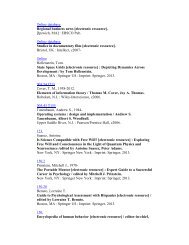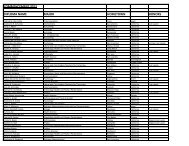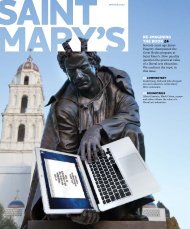Psychology Curriculum144 Middle ChildhoodThe purpose <strong>of</strong> this course is to examine the key developmental tasks <strong>of</strong>middle childhood, including the development <strong>of</strong> achievement motivation,positive peer relationships, moral responsibility, self-regulation, and initialmastery <strong>of</strong> the skills important to one’s culture. Students will observechildren in various settings, including school, organized sports, andinformal play settings, to investigate how the peer culture influencesdevelopment. Students will also conduct an ethnographic pilot study <strong>of</strong>a peer culture. Prerequisite: Psychology 139 or 140.147 Psychology <strong>of</strong> GenderA critical review <strong>of</strong> the theory and research on gender from the biological,psychological, and sociological perspectives. The course explores the socialconstruction <strong>of</strong> gender and how it impacts human development and socialbehavior. Throughout the course, the interaction between gender and thecomplexities <strong>of</strong> race, culture and sexual orientation is considered.148 The Exceptional IndividualExamines individuals with special needs, be they physical, cognitive, orsocial/emotional. Causes, consequences, and treatment approachesare covered, as well as implications for development issues. Studentswill be required to visit facilities and interview individuals.Prerequisite: Psychology 139 or 140.Offered in alternate years.150 Theories <strong>of</strong> PersonalityA critical review <strong>of</strong> the traditional and modern theories <strong>of</strong> personality,including the psychoanalytic, neoanalytic, trait, behavioristic and humanisticperspectives, with a focus on personality development, assessmenttechniques, and application <strong>of</strong> theory to everyday life.152 Abnormal PsychologyThe abnormal personality with special emphasis on those afflicted withpsychoneuroses, psychoses, psychosomatic reactions, brain damage, orpersonality disorders.156 Personal and Pr<strong>of</strong>essional AdjustmentA research-oriented treatment <strong>of</strong> personal and vocational adjustment,including: stress and stress tolerance, defensive and constructivecoping, social and job satisfaction, behavior modification, and interpersonalcommunication.157 Human SexualityA review <strong>of</strong> the empirical evidence on human sexuality, with a focus onhistorical and cultural perspectives as well as the physiological, psychologicaland sociological basis for sexual behavior and sexual identity.160 Social PsychologyAn introduction to social psychology including the study <strong>of</strong> attitudeformation and change, social interaction, social norms, and cultural influenceson personality formation.165 Cross-Cultural PsychologyAn analysis <strong>of</strong> cultural influences on human behavior. Topics includecross-cultural methodology, perception, cognition, motivation, development,attitudes and prejudice, gender, adaptive and maladaptive patterns,and the construction <strong>of</strong> self. This course includes a community servicelearning component with CILSA. Fulfills the Diversity Requirement.Prerequisites: Psychology 1 and 2.170 Theories <strong>of</strong> CounselingA critical review <strong>of</strong> traditional and modern theories <strong>of</strong> counselingand psychotherapy.172 Groups and OrganizationsFundamental concepts <strong>of</strong> organizational theory as it applies to successfulgroup functioning, with a focus on group structure and group processes,team building, group norms and group communication. Prerequisites:Psychology 1 or 10, or junior standing in Psychology, Business Administration,or Sociology.174 Psychology <strong>of</strong> the FamilyA study <strong>of</strong> family dynamics and the influences which contribute to familydysfunction. Examination includes relationships between family patternsand childhood disorders.180 Organizational PsychologyExamines the major theoretical findings in the field concerning the relationshipbetween the individual and the organization, including the study<strong>of</strong> motivation, leadership, decision making, power and politics, corporateculture, and organizational development. Prerequisites: Psychology 1or 10, or junior standing in Psychology, Business Administration,or Sociology.195 Special Field StudyThis course may be taken only on a pass/fail basis and does not counttoward the major. Prerequisites: upper-division standing as a Psychologymajor, sponsorship by a Psychology faculty member, and approval <strong>of</strong> theDepartment <strong>of</strong> Psychology chair. This course may be taken for .25, .50.or 1.0 course credit as determined by the faculty sponsor.197 Special StudyAn independent study or research course for students whose needs arenot met by the regular course <strong>of</strong>ferings <strong>of</strong> the department. Permission <strong>of</strong>the sponsoring faculty member and department chair is required.199 Special Study — HonorsIndependent study and research on campus in an area <strong>of</strong> interest to thestudent culminating in a written presentation <strong>of</strong> the problem, method<strong>of</strong> analysis and findings. Prerequisites: upper-division standing as aPsychology major, B average in upper-division psychology coursesalready taken, consent <strong>of</strong> the instructor and the chair <strong>of</strong> the department.May be repeated for credit if content varies.159
Curriculum SociologySociologyIn our rapidly changing world, sociology provides us with a perspective to examine and to better understand the sometimesconfusing nature <strong>of</strong> human social life. Sociology asks, how is social life possible? What do patterns <strong>of</strong> social life tellus about the world we live in? What is the relationship <strong>of</strong> the individual to the social order? Why are some groups <strong>of</strong>people so different from those we are familiar with? What causes inequality in society and can it be eliminated?Sociology addresses the most pressing social issues in contemporary American society — racial and ethnic tensions,gender inequality, poverty, health and illness, social movements, crime and deviance, educational inequality, immigration,and problems in urban environments, just to name a few. Sociologists study everything from the social dynamics <strong>of</strong> twopeople in conversation to the social dynamics <strong>of</strong> political revolutions.Sociology provides students with a theoretical framework to help make sense <strong>of</strong> an increasingly complex world andthe place <strong>of</strong> the individual within that world. Sociology also provides students with specific methodological tools toinvestigate the social world and to collect and analyze data about the world we live in.The sociology major develops research skills, analytical skills, and communication skills that are well-suited to studentsinterested in careers in teaching, public and mental health, counseling, social work, the criminal justice system, publicpolicy, marketing, journalism, and the nonpr<strong>of</strong>it sector.Students can take advantage <strong>of</strong> the exchange course program to enroll in sociology and ethnic studies courses at theUniversity <strong>of</strong> <strong>California</strong>, Berkeley, as well as Mills <strong>College</strong> and <strong>California</strong> State University East Bay. The department <strong>of</strong>fersa field placement/internship program with neighboring institutions such as social service agencies and businesses.FACULTYRobert Bulman, Ph.D., Associate Pr<strong>of</strong>essor, ChairJohn Ely, Ph.D., Associate Pr<strong>of</strong>essorCynthia Ganote, Ph.D., Assistant Pr<strong>of</strong>essorPhylis Martinelli, Ph.D., Pr<strong>of</strong>essorLearning OutcomesWhen students have completed the sociology program they will be able to:• Understand sociological theory and methods and be able toapply theoretical explanations to empirical examples.• Work independently to research secondary sources usinglibrary resources. In addition, students will be able to collect andanalyze primary data.• Write research papers with a clear thesis statement with sufficientsupport for that thesis. Also, write papers in accordance with theethical and pr<strong>of</strong>essional standards <strong>of</strong> the American SociologicalAssociation.• Examine their own lives in social context and assess how their livesare affected by the specific time and place in which they live.• Employ critical reading, thinking, and writing skills that will allowthem to research, analyze, and report on a social issue in a way thatincorporates what they have learned while maintaining their ownauthentic voice.• Express themselves with confidence in both written andoral communication.Major RequirementsThe sociology major is comprised <strong>of</strong> 13 lower- andupper-division courses.A minimum acceptable grade <strong>of</strong> C– for coursework is required tocount toward the major. In addition, the minimum acceptable grade isC for the capstone courses Sociology 130, Sociological Theory andSociology 132, Research Methods.Lower DivisionSociology 2 Introduction to SociologySociology 4 Social ProblemsMathematics 4 Introduction to Probability and StatisticsUpper Division1. Sociology 134 Contemporary Social IssuesSociology 130 Sociological TheorySociology 132 Sociological Research MethodsII. Seven additional upper-division courses, five <strong>of</strong> which must beSociology courses, two <strong>of</strong> which may be Anthropology orSociology courses.160
















